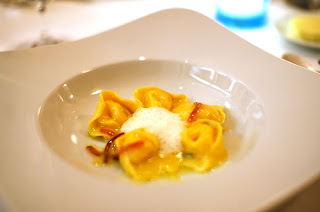 Restaurant Man by Joe Bastianich (New York: Viking Press, 2012. 275 pp)
Restaurant Man by Joe Bastianich (New York: Viking Press, 2012. 275 pp)
Joe Bastianich (b. 1968) is a restauranteur and vineyard owner as well as a judge for the cooking show Master Chef. Son of famous restauranteur, Lidia Bastianich, Joe owns the New York City restaurants Becco, Babbo Ristorante e Enoteca, Lupa, Esca, Casa Mono, Bar Jamón, Otto, Del Posto, and Eataly among others. Bastianich has also established three wineries: Azienda Agricola Bastianich, La Mozza s.r.l, and Trinono. He lives in Greenwich, Connecticut with his wife and three children.
Fighting Destiny
I specifically have told myself in the past that I never wanted to direct choirs, work in a private school, date a freshman in college, or date a sorority girl. I am now an established choir teacher in a private school who is married to my college sweetheart, Brynn, whom I started dating her freshman year. She is a member of the Sigma Kappa sorority.
The moral of the story is don’t fight destiny. Restaurant Man by Joe Bastianich chronicles his own fight with destiny. Steeped in the culture and lingo of New York City, Restaurant Man shares Bastianich’s adventures from his family’s first restaurant to his current chef enterprise of the Batali & Bastianich Hospitality Group.
Born into the “Business”
 |
| A dish being served at Felidia |
“She was a pioneer, bringing back wines that were mostly unknown outside their regions, and re-creating that authenticity in New York. That was the action—she wanted to be a gateway to Italian culture. Felidia was going to be about creating the experience of real Italian food, just like what you would have in Italy. She figured that everyone had had enough veal parmigiana and spaghetti and meatballs for a fucking lifetime—that was the bet” (31).
Wine Lover
Bastianich joined the restaurant team (in many different positions) from an early age, and saw the pitfalls of the restaurant business. He saw the grueling work, the countless hours, the sweat and tears. He was busing tables, and working very hard. As his parents began really investing in wine, so did he. Nino, the sommelier at Felidia took Joe under his wing.
“He was always saying, ‘Hey, kid, check this out. This is a ’47, a ’51, a ’53...’ Even then I was drinking thirty- our forty-year-old wine, fifty-year-old wine, and I could tell the difference. My mother always said I was a born taster. Nino was just trying to take care of the boss’s son, but I was getting an accidental education” (46).
 |
| Tuscan Vineyard |
“When it was time to collect my end-of-year bonus, I just figured enough already. I tried to make it work, but fuck it, it was a big world, and I was going to get my ass the hell out of there. I remember I was just pacing around, and every half hour I’d go down to the ATM to see if my six-digit bonus had cleared—it was an obscene amount of money they were giving me, especially for someone who was about to leave their church. And as soon as it showed up in my bank account, I hit the ground running. See ya. No shit, I went right to a travel agent and bought a one-way ticket to Italy. Then I felt like I could breathe again” (67).
Upon returning to New York, Bastianich met Mario Batali, and they decided to open a restaurant together. The rest, as they say, is history. From there, the book chronicles the partnership between the two, as well as their adventures in the U.S. and Italy. Bastianich talks of his restaurant math and the business savvy he has to juggle to keep the restaurant empire afloat. For a mere two-hundred-odd pages, there is an incredible amount of content in the book. Not to gloss over Restaurant Man , but there is simply too much to mention in one review.
One Last Note
Plagued with language that would make your mother blush, the Restaurant Man reads like sailor talk. But, such is the restaurant world—it is crass and vulgar during the best of times. Restaurant Man serves as an incredible memoir of a man fighting destiny, but it also serves as an excellent guide for anyone wishing to enter the restaurant business.
The ubiquitous self-congratulatory tone present in the book is incredibly annoying at first, but after a while you realize it’s deserved as Bastianich is tremendously successful. If you want to enter the restaurant business, or enjoy books about food and wine, Restaurant Man is for you.
Verdict: 4 out of 5
What are your thoughts? Have you enjoyed any of the restaurants from Bastianich and Batali? Did you find the book to be too self-congratulatory? Share your thoughts below.
---
Posted by: Andrew Jacobson
No comments:
Post a Comment